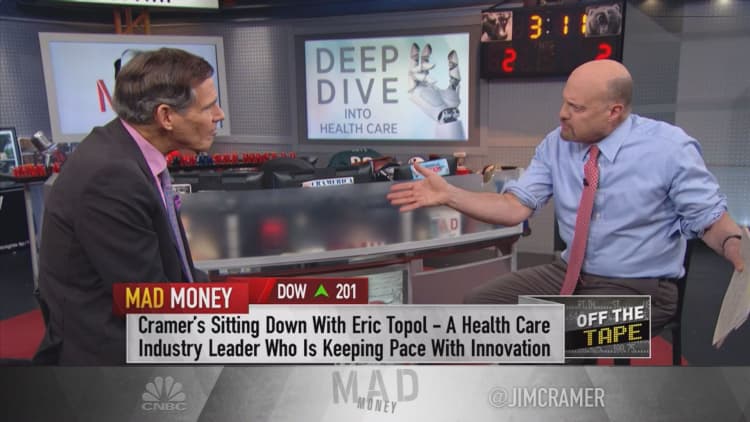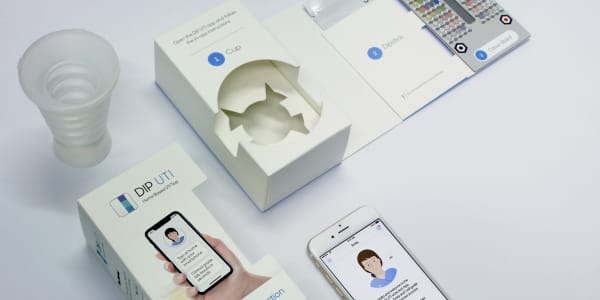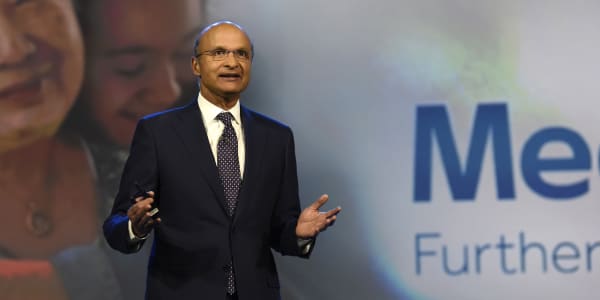Many doctors take a very conservative view when it comes to new technology. But Eric Topol, a cardiologist and author, is a self-described "digital geek," a long-time proponent of using the latest gadgets in medicine. He even upgraded his black bag to include wearables and connected medical devices, rather than the old analog blood pressure cuffs and stethoscopes.
So for technology companies like Apple, Alphabet and Microsoft, Topol is an important ally as they get deeper into the medical sector. It can't hurt that he's one of the most influential doctors on social media, with over 150,000 Twitter followers.
But Topol is no evangelist. He's not afraid to criticize technologies and trends that he believes are over-hyped, and he's taken companies to task when he thinks they could do more to provide scientific evidence to back up their claims.
He wrote about the role of technology in medicine more broadly in his new book, "Deep Medicine: How Artificial Intelligence Can Make Healthcare Human Again. In the book, he describes how advanced technology, namely artificial intelligence, can help with the busywork that physician do, like filling out fields in a medical record, so they can dedicate more time to patients. As he puts it: "As machines get smarter and take on suitable tasks, humans might actually find it easier to be more humane."
Here's our full interview ahead of the book's release, edited for brevity.
CHRISTINA FARR: So you recently tracked attempted to track your diet using A.I., which you talked about in the book and an in op-ed. Can an algorithm tell us how to eat?
ERIC TOPOL: I recorded everything I ate for two weeks, so an algorithm could learn from thousands of people's data, including their glucose spikes, and figure out what drives them. It really showed the complexities of building an individualized diet, which might not be palatable and doesn't take into account medical issues like kidney stones. There were a lot of misfires. Honestly, it was a total pain in the neck because every time I ate something, I had to remember to write it down and you couldn't just randomly snack and forget about it. I don't recommend it, but I wanted to show in the book what we're learning and how we're just not there yet.
FARR: Are there areas in medicine where you really are already seeing an impact because of A.I.?
TOPOL: There are lots of things that are approved by the U.S. Food and Drug Administration, which are already having uptake. There was a first consumer approval for a smartwatch (the Apple Watch) to track heart arrhythmias which is a step forward although it could end up backfiring because of all the false positives and unnecessary testing that's done in low-risk people. There are also algorithms approved to help radiologists. These are starting to take hold but they are not yet mainstream yet, which shows how the field has begun but it's still early. I don't think anything cleared or approved by FDA has the kind of impact that I envision in the years ahead.
FARR: You wrote in the book about the race between Apple and a start-up called AliveCor to get an electrocardiogram to detect arrhythmias to market. You note that AliveCor, a lesser-known company got there first. Can you say more about that?
TOPOL: I think a lot of people wouldn't have known about AliveCor being almost a year ahead because Apple didn't acknowledge them when they had the big event to launch its electrocardiogram. (Note: AliveCor and Apple have a slightly different approach, as detailed here).
AliveCor's approach might not be as slick as what Apple came out with, but I wrote in the chapter about them also being the first to develop a way to test for potassium levels on the watch in partnership with Mayo Clinic. That kind of bloodless potassium test is something we could have never envisioned, and it's really important for people with kidney disease. And the whole thing could have been moved had the computer scientists not let the data talk without bias. There are a lot of interesting lessons from AliveCor's story I think.
FARR: I would suspect Apple is following suit.
TOPOL: Oh, I would guess.
FARR: Do you see a difference in how each generation of tech has approached the health market? There was a group of companies that tried about a decade ago, including Google and Microsoft, which did not succeed as they expected. Now they're back, alongside Apple and Amazon.
TOPOL: Back then, there were some abject failures of entities like Google to the health record world. Now, there's a serious effort that has a lot of resources and people. It's really pervasive across the tech titan companies. They've hired physicians with dedicated teams. And it's not just about health records. It's about everything in health care.
FARR: Do you think we can trust these companies with our data? That's a topic you're very passionate about.
TOPOL: HIPAA (the rules that govern how health information is shared is certain circumstances) isn't enough to protect our data. It's a disaster. Patient data is routinely being sold and broken and stolen, and medical identity theft is raging on. We have 100 million Americans who have had their data hacked, and we have hospital systems being held hostage.We're not there yet at a place where I believe we need to be, where every person should own their own data. No one has it now because it's being held in lots of different places, with some in paper and some electronic.
FARR: How does that impact companies in the artificial intelligence world trying to get into health care?
TOPOL: I think if the person doesn't own their data and get it as inputs, then artificial intelligence is markedly diminished in terms of benefits for that person. At best, you can scrape a portal for a glimpse.
FARR: Will it ever happen where we can all own our health data?
TOPOL: We have models in other countries like Estonia. But we aren't doing that in this country. There aren't resources. In other countries, there are large resources to help health care invest in the power of A.I., but there's a model here that's highly paternalistic and not at all supporting the autonomy of patients.
FARR: Speaking of A.I., I've seen a lot of medical chatbots emerge that claim to do everything from navigate patients to the right place, whether it's the hospital or doctor's office, and even diagnose disease. What are your thoughts on that technology?
TOPOL: I see some problems, which I emphasize in the book. They have to go through careful validation, including with peer-reviewed publication. No chatbot has gone through a rigorous process like that. There have been some small randomized trials with some technologies, but the testing was limited. We have seen some evidence that people would rather reveal their inner most secrets to an avatar, which is interesting, and there are ways to take advantage of that right now with A.I. but it's theoretical.
FARR: How much of A.I. in medicine is actually A.I. versus an engineer with a spreadsheet?
TOPOL: A lot of A.I. is just basic mathematics. The term is used loosely, and I was specifically interested in a subtype called "deep learning." But as much as I talk about the technology, I also have a chapter on "deep empathy," meaning that we aren't selecting today for physicians who have a lot of compassion and empathy. We have the opportunity to use the future to bring back the past, which involves training physicians and selecting them to have those qualities. That's where I think we're headed.
WATCH: Eric Topol talks to Jim Cramer about data sets transforming the future of cancer.






